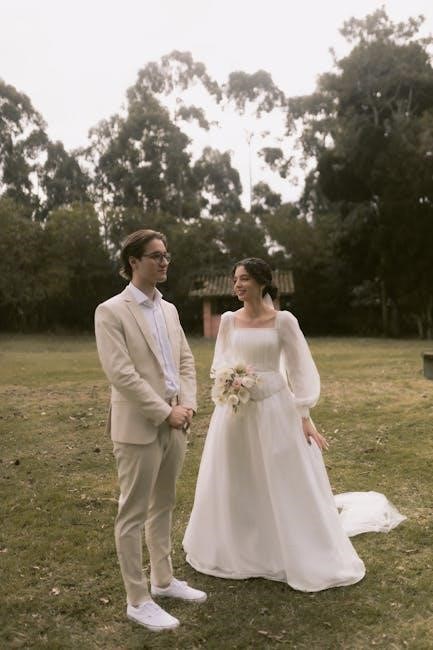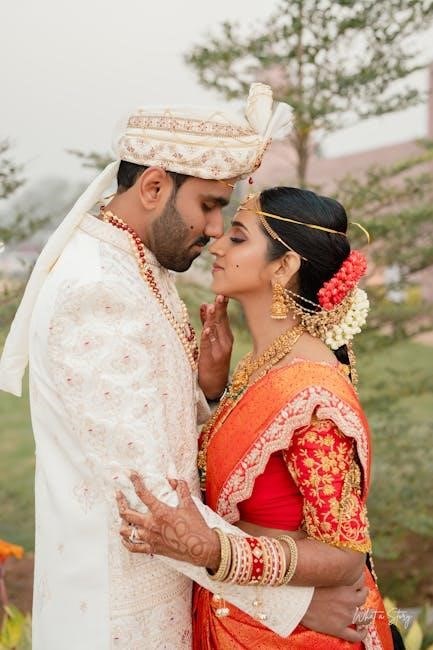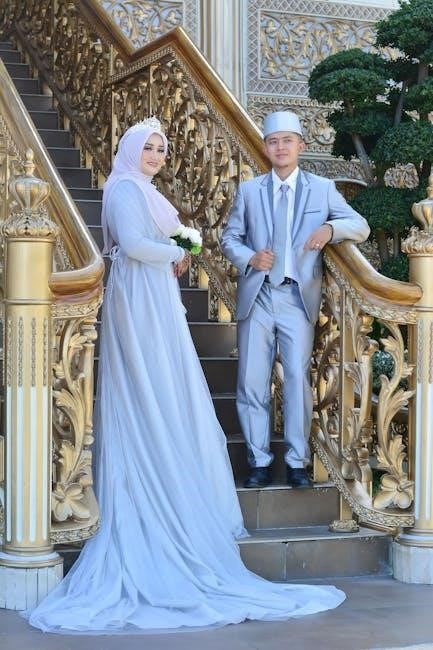the meaning of marriage pdf
Uncover the essence of marriage in our insightful PDF guide. Explore the depth, commitment, and love that define matrimony. Download now!
Marriage is a profound commitment between two individuals, representing emotional, social, and legal bonding. It symbolizes love, trust, and mutual support, forming the foundation of families and societies.
Culturally, marriage varies widely, reflecting diverse traditions and values. It is often viewed as a lifelong partnership, fostering personal growth and shared responsibilities.
The meaning of marriage extends beyond romance, encompassing legal rights, emotional intimacy, and societal recognition. It remains a cornerstone of human relationships, shaping identities and communities globally.
1.1 What is Marriage?
Marriage is a legal, emotional, and social bond between two individuals, often viewed as a lifelong commitment. It centers on love, trust, and mutual respect, involving shared responsibilities and goals. Marriage fosters personal growth and strengthens societal ties, forming the foundation of families and communities. Its essence lies in unity and partnership, symbolizing a shared journey through life’s challenges and celebrations.
1.2 The Significance of Marriage in Society
Marriage significantly impacts societal structures by establishing legal rights and influencing economic policies. It shapes social roles and responsibilities, fostering a sense of belonging and community engagement. By providing a framework for family life, marriage contributes to social cohesion and cultural continuity, thereby enriching the societal fabric and promoting collective prosperity.

Historical Perspectives on Marriage
Marriage has evolved significantly across eras, shaped by cultural, religious, and legal frameworks. Historical practices reflect societal values, influencing its role and perception over time.
2.1 Marriage in Ancient Civilizations
Marriage in ancient civilizations was often a societal and economic arrangement, serving to establish alliances, secure property, and maintain social order. In Mesopotamia, marriage contracts were formalized, while in ancient Egypt, it was a private affair focused on family stability. Roman and Greek cultures emphasized procreation and civic duty. These practices laid the groundwork for modern marital institutions, highlighting the enduring role of marriage in societal structure and human relationships across history.
2.2 The Evolution of Marriage Over Time
Marriage has evolved significantly over centuries, shifting from a primarily economic and social arrangement to a partnership based on love and mutual respect. Ancient practices focused on alliances and property, while modern marriages emphasize emotional connection and equality. Legal and societal changes, such as the recognition of same-sex marriage, reflect its adaptability to cultural shifts. This evolution highlights marriage’s enduring role in human society, blending tradition with contemporary values.
The Emotional Connection in Marriage
Marriage thrives on emotional intimacy, fostering deep trust and understanding. Shared experiences and mutual support strengthen the bond, creating a foundation for lifelong partnership and personal growth.
3.1 Love and Attachment in Marriage
Love and attachment form the bedrock of marriage, fostering emotional bonds and mutual understanding. Attachment theory highlights the importance of security and trust, enabling partners to navigate life’s challenges together. Love evolves from passion to deep affection, creating a lasting connection. Shared experiences and vulnerability strengthen this attachment, reinforcing commitment and intimacy. This emotional foundation is essential for a fulfilling and enduring marital relationship, promoting personal growth and harmony.
3.2 Trust and Intimacy as Foundations of Marriage
Trust and intimacy are the pillars of a successful marriage, fostering a safe and nurturing environment. Trust builds reliability and confidence, allowing partners to rely on each other through life’s uncertainties. Intimacy, both emotional and physical, deepens connection and strengthens bonds. Open communication and transparency are key to maintaining these elements. When trust and intimacy are prioritized, they create a resilient foundation for enduring love and mutual respect in marriage.
Commitment and Fidelity in Marriage
Commitment and fidelity are cornerstones of marriage, reflecting mutual dedication and loyalty. They foster resilience, creating a lasting partnership rooted in trust and unwavering support.
4.1 Understanding Commitment in Modern Marriage
Commitment in modern marriage is a conscious choice to prioritize mutual growth, trust, and respect. It involves emotional and psychological dedication, transcending traditional roles. Today, couples view commitment as a dynamic process, adapting to changing circumstances while maintaining steadfast loyalty. Open communication and shared goals strengthen this bond. Commitment fosters resilience, enabling partners to navigate life’s challenges together, ultimately deepening their connection and sustaining a fulfilling marriage.
4.2 The Role of Fidelity in Building Trust
Fidelity is a cornerstone of trust in marriage, ensuring emotional security and stability. It involves loyalty and exclusivity, fostering a safe environment for vulnerability. Trust, once established, strengthens commitment and intimacy. Infidelity can erode trust, highlighting the importance of transparency and accountability. Fidelity fosters a resilient bond, allowing couples to navigate challenges with confidence and mutual respect, ultimately reinforcing the foundation of a lasting and fulfilling marriage.

Communication in Marriage
Effective communication is the heart of a thriving marriage, encompassing both verbal and non-verbal elements to foster mutual understanding, resolve conflicts, and build trust through empathy and respect, fostering a resilient partnership.
5.1 Effective Communication Strategies
Active listening and empathy are vital for effective communication in marriage. Couples should express thoughts clearly, avoid assumptions, and use positive language to prevent misunderstandings. Regular, open conversations help build trust and intimacy, ensuring both partners feel heard and valued. Implementing these strategies fosters a supportive and understanding environment, strengthening the marital bond and promoting long-term harmony.
5.2 Overcoming Barriers to Healthy Communication
Common barriers to healthy communication include misunderstandings, emotional reactivity, and unexpressed feelings. Couples can overcome these by practicing empathy, clarity, and patience. Setting aside dedicated time to talk without distractions fosters openness. Using “I” statements instead of “you” statements reduces blame and defensiveness. Seeking professional guidance, like counseling, can also help navigate persistent communication challenges, ensuring both partners feel heard and understood.

Cultural Diversity in Marriage
Cultural diversity in marriage reflects varying practices and values across societies. Different traditions shape how unions are interpreted and celebrated. Understanding these differences fosters mutual respect and strengthens marital bonds.

6.1 Marriage Rituals Across Different Cultures
Marriage rituals vary widely across cultures, reflecting local traditions and values. In India, vibrant ceremonies with elaborate customs and attire are common. African cultures often include community participation and symbolic acts. In Japan, Shinto ceremonies blend spiritual elements with modern practices. These rituals highlight the diversity and richness of global marital traditions, emphasizing unity and cultural heritage.
6.2 The Impact of Cultural Differences on Marriage
Cultural differences can significantly influence marital dynamics, shaping expectations, communication styles, and conflict resolution. Couples from diverse backgrounds may face challenges in reconciling traditions, values, and lifestyles. Open dialogue, mutual respect, and adaptability are crucial for navigating these differences. Understanding and embracing cultural diversity can strengthen the bond, fostering a richer, more inclusive relationship. Effective communication strategies, such as active listening, help bridge gaps and build harmony.

Challenges in Modern Marriage
Modern marriage faces challenges like maintaining intimacy, balancing careers, financial stress, and societal changes. Issues such as ghosting and evolving expectations test trust and commitment in relationships.

7.1 Common Issues Faced by Couples Today
Modern couples often struggle with communication breakdowns, balancing work-life responsibilities, and financial stress. Societal changes and evolving expectations can lead to conflicts over roles and responsibilities. Additionally, issues like infidelity, lack of intimacy, and differing life goals frequently arise. These challenges are compounded by the pressures of maintaining independence while fostering a united partnership. Effective conflict resolution and emotional support are essential to navigating these complexities successfully.
- Communication breakdowns and emotional disconnection.
- Financial stress and differing spending habits.
- Work-life balance and career prioritization.
- Infidelity and trust issues.
7.2 Navigating Conflict Resolution in Marriage
Effective conflict resolution in marriage requires empathy, active listening, and mutual respect. Couples should address issues calmly, focusing on solutions rather than blame. Open communication helps clarify misunderstandings and strengthens trust. Compromise and understanding each partner’s perspective are key to resolving disputes amicably. Seeking professional counseling can also provide tools to manage conflicts healthily and sustain a harmonious relationship.
- Practice active listening and empathy.
- Avoid blaming or defensive behaviors.
- Focus on solutions rather than past grievances.
- Seek compromise and mutual understanding.
Personal Growth Through Marriage
Marriage fosters emotional maturity and self-discovery, encouraging individuals to grow through shared experiences, accountability, and mutual support. It nurtures empathy, understanding, and personal development in a lifelong journey.
8.1 How Marriage Fosters Emotional Maturity
Marriage encourages emotional growth by fostering accountability, empathy, and understanding. Through shared responsibilities and challenges, individuals develop patience and resilience. The bonds of trust and intimacy help partners navigate life’s complexities, promoting self-awareness and emotional intelligence. Marriage provides a platform for personal transformation, enabling individuals to evolve into more compassionate and mature versions of themselves, fostering a deeper connection with their partner and the world around them.
8.2 Marriage as a Journey of Self-Discovery
Marriage serves as a transformative journey of self-discovery, where individuals uncover new aspects of themselves through shared experiences and challenges. It fosters personal growth, as partners learn to adapt, communicate, and understand each other’s needs. This lifelong commitment reveals one’s strengths, vulnerabilities, and aspirations, encouraging introspection and evolution. Marriage becomes a catalyst for self-awareness, helping individuals align their values and goals, and embrace change, leading to a deeper understanding of oneself and their place in the relationship.
The Role of Marriage in Society
Marriage is a cornerstone of societal structure, fostering stability, economic cooperation, and cultural continuity. It provides legal recognition, emotional support, and a framework for raising families, benefiting communities.
9.1 Marriage as a Social Institution
Marriage serves as a fundamental social institution, providing a structured framework for relationships, family formation, and cultural transmission. It establishes roles, responsibilities, and norms, contributing to societal stability and continuity. Marriage institutions often reflect cultural values, legal systems, and economic practices, making it a cornerstone of social organization and cohesion across diverse societies globally.
9.2 The Impact of Marriage on Family and Community
Marriage significantly influences family dynamics by fostering emotional and financial stability. It creates a supportive environment for raising children, promoting shared values and responsibilities. Strong marital relationships often lead to healthier family bonds and improved well-being for all members.
Within communities, marriage fosters social cohesion, as it establishes committed partnerships that contribute to collective stability. It encourages cooperation, mutual respect, and a sense of belonging, strengthening societal fabric and promoting harmonious coexistence.
Modern Reinterpretations of Marriage
Modern reinterpretations of marriage emphasize equality, blending cultures, and personal ceremonies, reflecting evolving societal values and individual preferences, influenced by technology and non-traditional structures.
10.1 Same-Sex Marriage and Its Significance
Same-sex marriage has become a landmark of modern societal progress, symbolizing equality and challenging traditional norms. Its legalization in many countries reflects shifting attitudes toward inclusivity and human rights.
It redefines marriage as a union based on love and commitment, regardless of gender, fostering acceptance and challenging conventional definitions of relationships and family structures globally.
10.2 The Rise of Non-Traditional Marriage Models

Non-traditional marriage models, such as polyamory, open marriages, and cohabitation without legal ties, are gaining acceptance. These arrangements reflect shifting societal norms and individual preferences for flexibility and autonomy in relationships.
Such models emphasize personal freedom, mutual respect, and tailored commitments, challenging conventional notions of marriage. They underscore the diversity of modern love and partnership, offering alternatives to traditional structures while maintaining emotional and often financial interdependence.

Spirituality and Marriage
Spirituality in marriage often serves as a deep emotional bond, fostering shared beliefs and values. It provides a foundation for mutual support and strengthens relationships through faith and shared practices.
11.1 The Role of Faith in Strengthening Marriage
Faith serves as a foundation for emotional and spiritual connection in marriage. Shared beliefs and practices create unity, fostering a sense of purpose and belonging. Faith often provides guiding principles, such as forgiveness and commitment, helping couples navigate life’s challenges. Through shared spiritual practices, partners deepen their bond, enhancing intimacy and fostering resilience in their relationship. This shared faith becomes a source of strength, enriching the marital journey.
11.2 Spiritual Practices That Enhance Marital Relationships
Spiritual practices, such as prayer, meditation, and shared rituals, foster emotional and spiritual connection in marriage. These practices encourage gratitude, humility, and empathy, strengthening the bond between partners. Regular reflection and mindfulness help couples align their values and goals, promoting harmony and understanding. By cultivating a deeper spiritual connection, partners often experience increased patience, forgiveness, and resilience, enriching their relationship and nurturing a lifelong commitment to one another.

Marriage remains a timeless institution, symbolizing love, commitment, and partnership. Its essence lies in fostering emotional and spiritual growth, ensuring a lasting bond between individuals and society.
12.1 The Timeless Value of Marriage
Marriage holds enduring significance, transcending time and cultural shifts. It embodies profound values such as love, trust, and mutual respect, serving as a foundation for personal growth and societal stability. Through its enduring nature, marriage continues to inspire and unite individuals, fostering a sense of belonging and continuity across generations.
12.2 The Future of Marriage in a Changing World
Marriage continues to evolve, adapting to societal shifts and cultural transformations. As modern values emphasize equality and individuality, marriages are increasingly viewed as partnerships rooted in mutual respect and shared goals. Despite challenges like changing relationship dynamics, marriage remains a cornerstone of human connection, offering stability and emotional fulfillment in an ever-changing world.

